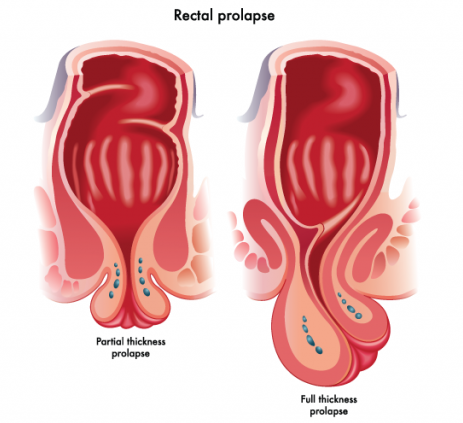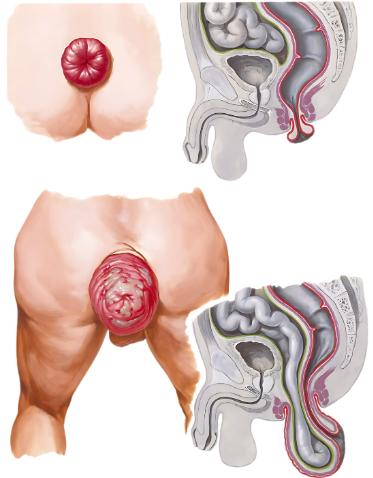KK Virat Hospital in Karimnagar offers expert treatment for rectal prolapse, using advanced surgical and non-surgical techniques for effective relief. Our specialists provide personalized care, including minimally invasive procedures like laparoscopic and laser surgery, ensuring faster recovery with minimal discomfort. Experience the best proctology care with high success rates and comprehensive post-treatment support for long-term health.
Understanding Rectal Prolapse!
Rectal prolapse is a condition where the rectum slips down through the anus, causing discomfort and potential complications such as rectal bleeding, ulceration, and strangulation. Timely medical intervention is crucial to prevent worsening symptoms. At KK Virat Hospital, Karimnagar, we specialize in advanced surgical treatments for rectal prolapse, ensuring effective relief and recovery for our patients.


Diagnosis of Rectal Prolapse
Our proctologists conduct a comprehensive evaluation, including:
- Transit Study: Tracking digestion using marker capsules. Additional urological and gynaecological tests may be recommended to check for pelvic floor weaknesses.
- Physical Examination: Assessing the rectum and checking the strength of the anal sphincter.
- Anal Electromyography (EMG): Evaluating muscle and nerve function in the rectum.
- Colonoscopy: Using a camera-equipped tube to inspect the rectal and intestinal lining.
- Anorectal Manometry: Measuring rectal response to pressure.
- Barium Enema & Lower GI Series: X-ray imaging using a contrast substance to assess the intestines.
- Defecography: Monitoring bowel movements via X-ray or MRI.
Surgical Treatment Options
At KK Virat Hospital, we offer various surgical approaches tailored to patient needs:
Rectopexy (Abdominal Approach)
- Performed under general anaesthesia with a short hospital stay.
- Involves repositioning and securing the rectum to the sacrum.
- High success rate with a low recurrence risk.
Laparoscopic Rectal Prolapse Surgery
- Minimally invasive approach with smaller incisions.
- Reduced pain, faster recovery, and lower complication risks.
- Patients typically resume normal activities within a few weeks.
Robotic-Assisted Surgery
- Enhances precision with robotic technology.
- Benefits include minimal blood loss, less pain, and faster recovery.
Perineal Rectosigmoidectomy
- Removes part of the rectum and sigmoid colon via the perineum.
- Recommended for elderly patients or those unsuitable for abdominal surgery.
Delorme Procedure
- Involves folding and suturing the rectal wall to strengthen weak tissue.
- Shorter recovery period (2-4 weeks) with improved bowel function.
Benefits of Laser Surgery for Rectal Prolapse
- Minimally invasive with no major incisions.
- Outpatient procedure with minimal downtime.
- Less pain and faster recovery.
- Lower risk of complications, bleeding, and infections.
- Improved bowel function and reduced recurrence risk.
Preparation for Surgery
- Full recovery takes approximately 4-6 weeks.
- Take prescribed medications and manage discomfort with ice packs.
- Avoid strenuous activities and heavy lifting.
- Follow a high-fiber diet to prevent constipation.
- Stay hydrated and use stool softeners if needed.
- Attend all follow-up appointments for monitoring.
- Seek immediate medical attention for severe pain, fever, or abnormal symptoms.
Lifestyle Changes Post-Surgery
- Maintain a high-fiber diet.
- Stay hydrated to prevent constipation.
- Exercise regularly to strengthen pelvic muscles.
- Avoid heavy lifting and straining during bowel movements.
- Maintain a healthy weight to reduce rectal pressure.
Potential Risks and Complications
- Infection, bleeding, or damage to nearby organs.
- Urinary retention or bowel obstruction.
- Temporary or long-term faecal incontinence.
- Recurrence of rectal prolapse in some cases.
- Anesthesia-related risks.
Non-Surgical Treatment Options
In mild cases, rectal prolapse can be managed through:
- Hydration & Ice Packs: Reducing swelling and discomfort.
- Kegel Exercises: Strengthening pelvic floor muscles.
- High-Fiber Diet: Preventing constipation and straining.
- Bowel Management Techniques: Avoiding prolonged stool retention.
Signs of Healing After Rectal Prolapse Treatment
- Reduced prolapse size and occurrence.
- Less pain, bleeding, and mucus discharge.
- Improved bowel function and control.
Consequences of Untreated Rectal Prolapse
- Increased severity and difficulty in manual repositioning.
- Chronic constipation and faecal incontinence.
- Risk of strangulated rectum leading to tissue death.
- Psychological distress and reduced quality of life.
Dietary Recommendations for Rectal Prolapse Patients
- Eat high-fiber foods such as fruits, vegetables, and whole grains.
- Drink plenty of water to maintain stool consistency.
- Avoid processed and low-fiber foods that cause constipation.
Why Choose KK Virat Hospital for Rectal Prolapse?
- Experienced Specialists: Our team of skilled proctologists provides expert diagnosis and treatment.
- Advanced Technology: We utilize cutting-edge techniques such as laser and robotic-assisted surgery.
- Comprehensive Care: From diagnosis to post-surgical recovery, we ensure complete support.
- Minimally Invasive Procedures: Faster recovery, minimal pain, and reduced risk of complications.
- Personalized Treatment Plans: Tailored approaches for each patient’s unique condition.
- High Success Rates: Proven outcomes with reduced recurrence rates.
Your Health, Our Priority – Book Your Consultation Today!
At KK Virat Hospital, Karimnagar, our proctology specialists are dedicated to providing the best surgical and non-surgical treatments for rectal prolapse. Book an appointment today for expert evaluation and care tailored to your needs.
- Call Us Directly: Get in touch with our medical coordinators to schedule an appointment with an expert urologist.
- Direct Visit: You can visit our hospital directly by carrying your previous medical records if you have a medical history. However, admission will be based on the doctor’s recommendation.
What are the causes of rectal prolapse?
Rectal prolapse can be caused by chronic constipation, prolonged straining during bowel movements, weakened pelvic floor muscles, aging, childbirth trauma, and nerve damage.
How do you know you have rectal prolapse?
Symptoms include a visible bulging or protrusion of the rectum through the anus, discomfort, difficulty in controlling bowel movements, bleeding, mucus discharge, and a feeling of incomplete evacuation.
What is the difference between rectal prolapse and haemorrhoids?
Rectal prolapse involves the entire rectal wall slipping through the anus, whereas haemorrhoids are swollen blood vessels in the rectum or anus. Rectal prolapse is more severe and requires medical intervention.
Can rectal prolapse get better on its own?
In mild cases, lifestyle changes such as a high-fiber diet and pelvic floor exercises may help. However, moderate to severe prolapse typically requires medical or surgical treatment to prevent complications.
What are the risk factors for rectal prolapse?
Risk factors include chronic constipation, diarrhea, aging, multiple vaginal deliveries, nerve disorders, previous pelvic surgeries, and conditions affecting muscle strength.
How can you prevent rectal prolapse?
Preventive measures include maintaining a high-fiber diet, staying hydrated, avoiding excessive straining during bowel movements, exercising to strengthen pelvic floor muscles, and managing chronic digestive issues.
How serious is rectal prolapse?
Rectal prolapse can lead to complications such as incontinence, chronic discomfort, infections, and, in severe cases, tissue strangulation, which may require emergency surgery.
What are the treatment options for rectal prolapse?
Treatment options include dietary and lifestyle changes, physical therapy, and various surgical procedures such as rectopexy, laparoscopic surgery, and perineal repair, depending on severity.
Is surgery always required for rectal prolapse?
Not always. Mild cases can be managed with conservative treatments, but persistent or severe cases typically require surgical intervention for lasting relief.
What is the recovery time after rectal prolapse surgery?
Recovery time varies depending on the procedure but generally takes about 4-6 weeks. Patients are advised to follow post-operative care instructions, avoid heavy lifting, and maintain a fiber-rich diet.


